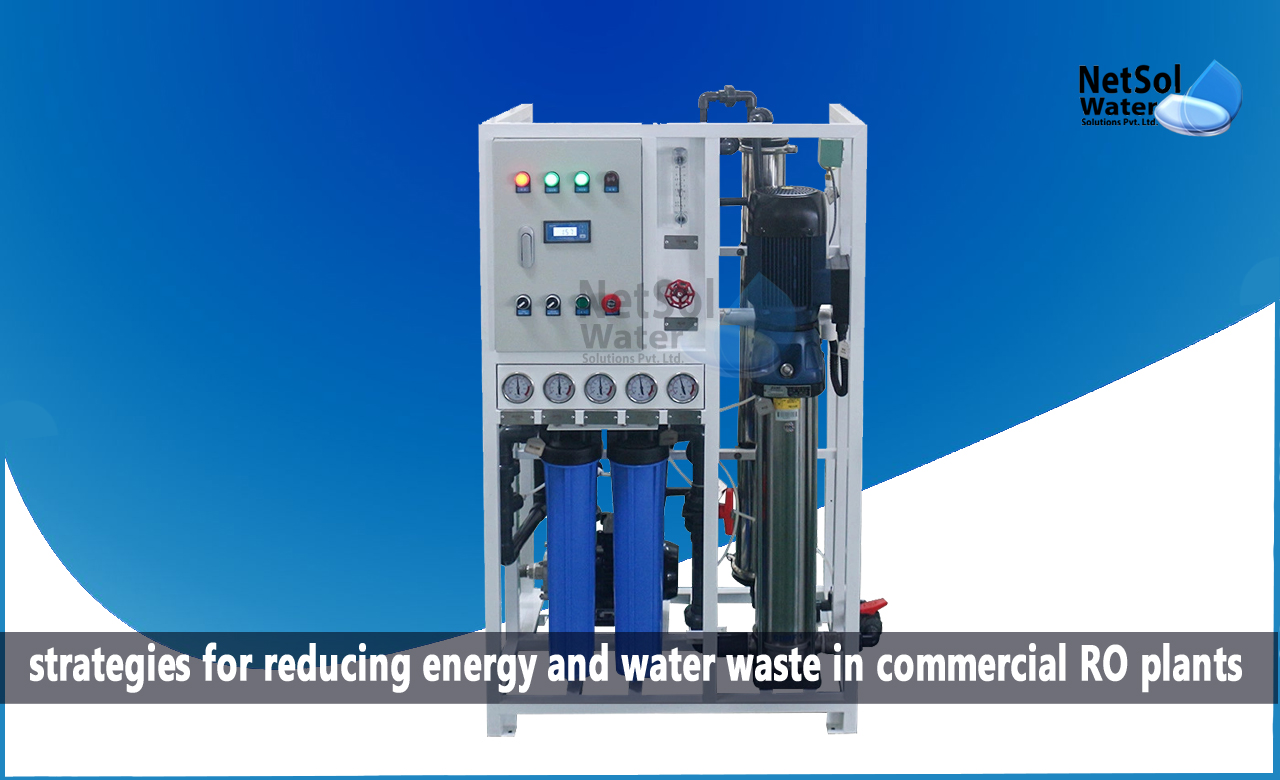Energy and water saving strategies for commercial RO plants
Commercial RO plants are highly efficient in removing impurities from wastewater and producing high-quality treated water. However, the process can also be energy-intensive and result in water waste, making sustainability a critical concern for industries using RO technology.
In this blog, we will explore strategies for reducing energy and water waste in commercial RO plants, promoting sustainable and efficient operations.
1. Conduct Regular Maintenance: Regular maintenance of RO plants is essential to ensure optimal performance and minimize energy and water waste. Fouled membranes can reduce the efficiency of the treatment process, leading to increased energy consumption and reduced water recovery. By conducting routine maintenance, such as membrane cleaning and replacement, industries can improve the efficiency and effectiveness of their RO plants, resulting in reduced energy consumption and water waste.
2. Implement Energy Recovery Devices: Energy recovery devices, such as pressure exchangers and turbine systems, can recover energy from the RO process and reuse it within the plant. By utilizing this energy, industries can reduce their energy consumption and operating costs. The recovered energy can be used to power pumps, compressors, and other equipment, reducing the overall energy consumption of the plant.
3. Optimize the RO Process: The RO process can be optimized to reduce energy and water waste. By adjusting factors such as feed flow rate, operating pressure, and recovery rate, industries can optimize the RO process to minimize energy consumption and maximize water recovery. An optimized RO process can also extend the life of the membrane and reduce maintenance requirements, resulting in reduced energy consumption and costs.
4. Utilize Advanced Membrane Technology: Advancements in membrane technology have improved the efficiency and effectiveness of RO plants. High-efficiency membranes, such as low-energy and high-rejection membranes, can reduce energy consumption and improve water recovery rates. By utilizing advanced membrane technology, industries can reduce their environmental impact and operating costs.
5. Implement Water Reuse and Recycling: Water reuse and recycling can reduce water waste and improve the sustainability of commercial RO plants. By reusing treated water for non-potable applications, such as irrigation and industrial processes, industries can reduce their water consumption and promote sustainable operations. Additionally, by implementing water recycling systems, industries can further reduce their water consumption and promote sustainable water management.
6. Monitor and Analyse Data: Monitoring and analysing data from the RO plant can identify areas of inefficiency and opportunities for optimization. By implementing monitoring systems, industries can identify trends and anomalies in the treatment process, enabling them to adjust operating parameters to optimize energy and water consumption. Additionally, by analysing data, industries can identify opportunities for improvements and make data-driven decisions to promote sustainability and efficiency.
7. Conduct a Water Audit: Conducting a water audit is an essential step in identifying areas of water waste and developing strategies to reduce water consumption. A water audit involves analysing the water usage patterns within the plant and identifying areas where water can be conserved. By conducting a water audit, industries can identify leaks, inefficient equipment, and other areas of water waste, enabling them to implement targeted solutions to reduce water consumption and promote sustainable operations.
8. Implement Process Controls: Process controls can help reduce energy and water waste by optimizing the treatment process based on real-time conditions. By implementing process controls, such as automated valves, sensors, and controllers, industries can adjust the RO process based on factors such as feedwater quality, temperature, and pressure. This can lead to improved efficiency and reduced energy and water waste.
9. Consider Alternative Water Sources: In some cases, alternative water sources may be available that can reduce the demand for freshwater and promote sustainable water management practices. For example, industries can utilize brackish water or seawater as a feed source for their RO plants. By utilizing alternative water sources, industries can reduce their reliance on freshwater resources and promote sustainable water management practices.
10. Educate Employees: Employee education is critical to promoting sustainable operations and reducing energy and water waste. By educating employees on sustainable practices, such as turning off equipment when not in use, using water-efficient fixtures, and properly disposing of waste, industries can promote a culture of sustainability within the organization. Additionally, providing training on the proper operation and maintenance of the RO plant can ensure optimal performance and reduce energy and water waste.
Conclusion:
In conclusion, sustainable operations are critical for commercial RO plants to reduce energy and water waste. Strategies such as regular maintenance, energy recovery devices, optimized RO processes, advanced membrane technology, water reuse and recycling, monitoring and analysing data, conducting a water audit, implementing process controls, considering alternative water sources, and educating employees can promote sustainable and efficient operations. By implementing these strategies, industries can reduce their environmental impact and operating costs while promoting sustainable water management practices. Ultimately, promoting sustainability in commercial RO plants is essential for preserving freshwater resources and promoting the long-term health of the environment.
For any other support, inquiries, or product purchases, call on +91-9650608473 or email at enquiry@netsolwater.com



